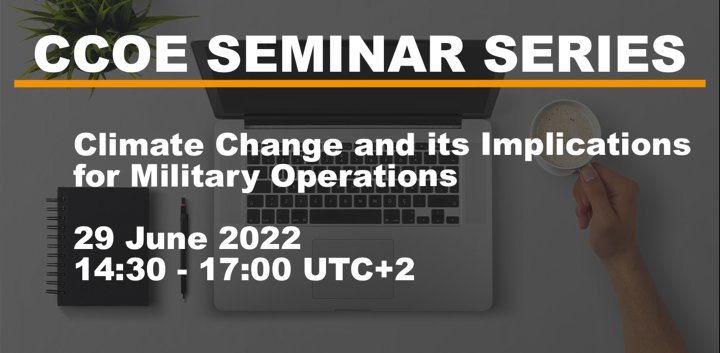Climate Change and its Implications for Military Operations (29 JUN 2022)
Climate change is one of the most important and immediate challenges that we expect in the future of NATO. Rising temperature limits the area of habitable lands causes draughts, and reduces the productivity of agricultural production, all leading to mass migration, food and health insecurity, as well as local political and societal instability. Other features of a changing climate, such as the melting of sea and land ice or the transformation of coastlines directly affect military strategy and infrastructures via opening up or closing down operational areas. In this fast-changing and turbulent environment, the role of NATO CIMIC in predicting, preparing for and reacting to negative effects of environmental change is essential for the stability and success of the Alliance.
This CCOE Seminar on Climate Change and its Implications for Military Operations explored the vocabulary, mechanics, causes and effects of climate change. Experts from both the military and private sectors discussed past examples of good and bad practises in relation to climate change, emphasising its security implications and highlighting its potential consequences. Based on these talking points, our guest lecturers indicated some possibilities for NATO CIMIC involvement in both tackling, preparing for and reacting to climate change.
As a conclusion, participants agreed that climate change is a fundamental security issue which requires appropriate attention from NATO. This treatment may derive from, among other things, a coherent and comprehensive CIMIC Analysis and Assessment concept that aids CIMIC officers in guiding commanders when NATO operations become subject of climate change.
The seminar was featured by presentations provided by well-known experts and a moderated Q&A session.
- Mr Jordan Beauregard, Senior Environmental Security Advisor at the United States Geological Survey, Virginia (USA),
- Dr Kira Vinke, Head of Center for Climate and Foreign Policy at the German Council on Foreign Relations, Berlin (DEU),
- Ms Maartje van Reedt Dortland, Climate Security Expert and Reserve Officer at 1 Civil Military Interaction Command, Apeldoorn (NLD)
exploring:
- What is Climate Change in general and what are the strategic consequences of the changing climate?
- How does the changing climate affect (future) military operations?
- How will Civil-Military Cooperation and Civil Affairs have to adapt to the consequences arriving from rapidly changing environmental conditions and circumstances?
Mr Jordan Beauregard
Jordan Beauregard serves as Senior Environmental Security Advisor to the Civil Applications Committee at the U.S. Geological Survey and co-chairs the U.S. Intelligence Community’s Environmental Security Working Group. In this role, he provides expertise on the integration of climate and environmental data and information for U.S. national security, law enforcement, and defense customers. Trained and certified in defense intelligence analysis - specializing in the intersections between climate and environmental security – Jordan has published expert commentary and presentations on the nexus of environmental, political, economic, and social trends, featured in outlets such as Homeland Security Today, Just Security, the Wilson Center’s New Security Beat, Modern War Institute, and the United Kingdom’s The Wavell Room. Jordan holds a degree in Global Affairs from George Mason University, he is a distinguished graduate of the U.S. Naval War College, and he holds a graduate degree in Strategic Intelligence from the National Intelligence University – the U.S. Intelligence Community’s sole degree-granting research institution. To connect with Jordan and learn more about his experience, please email him at jbeauregard@usgs.gov, Jordan.Beauregard@dodiis.mil, or find him on LinkedIn at: https://www.linkedin.com/in/jordanbeauregard.
Dr Kira Vinke
Dr. Kira Vinke heads the newly founded Center for Climate and Foreign Policy at the German Council on Foreign Relations (DGAP). She also co-chairs the Advisory Board to the German Federal Government on Civilian Crisis Prevention and Peacebuilding. Vinke is affiliated as a scientist with the Potsdam Institute for Climate Impact Research (PIK) where she led the East Africa Peru India Climate Capacities (EPICC) project before joining DGAP.
Until 2018, Vinke was a research analyst to the director of PIK. In this capacity, she worked from 2014 to 2016 as an analyst for the German Advisory Council on Global Change to the Federal Government (WBGU). She provided her expertise as a consultant for the German Development Cooperation (GIZ) and the Asian Development Bank. She has extensive field research experience in South Asia, the Pacific, and the Sahel. Vinke completed her doctoral dissertation (summa cum laude) at Humboldt-Universität zu Berlin on the subject of climate change and migration; her studies were funded by the Studienstiftung des deutschen Volkes. For her dissertation, she received the “Potsdamer Nachwuchswissenschaftler-Preis,” a prize for young scientists, from the city of Potsdam.
Ms Maartje van Reedt Dortland
Maartje van Reedt Dortland is an agricultural engineer from Wageningen, The Netherlands, with specialization on irrigation and water management.Within the Dutch Center for Logistics, She worked on innovations to decrease the logistical footprint, to increase operational effectiveness and to meet the sustainability goals of the Dutch Ministry of Defense.As a reservist of the Dutch Armed Forces, she is member of a Climate Change Working Group. This working group is aiming at raising attention on the climate change’s impact on the military.
Maartje is currently deployed as military gender adviser to the UNIFIL mission in Lebanon. Gender Equality is a cross cutting topic within the UN Sustainable Development Goals and so is Climate Action.
She is looking forward to work for NATO researching on the climate security nexus, after her mission deployment.

